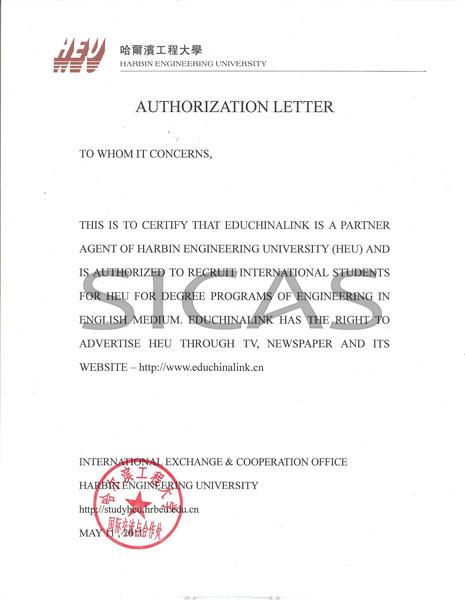Why Study in HEU
Harbin Engineering University (HEU) sits at the scenic Songhua River in the ice city of Harbin in North China. Subordinate to the Commission of Science, Technology and Industry for National Defense, HEU is a national key university of glorious history and fine traditions. It is among the first batch of "211 Project" universities that are entitled to enjoy first priority from the state in construction and development and also one of the universities that have Graduate School. Moreover, HEU is an important base for talent cultivation and scientific research in the fields of ship industry, ocean exploration and nuclear application.
The predecessor of HEU is PLA Military Engineering Institute established in 1953 (abbr. HME). In 1970, in the former location, Harbin Ship Engineering Institute was founded by the entire crew of naval engineering department and some other cadre teachers of every other department, and it was renamed Harbin Engineering University in 1994. HEU was selected as a national key university by the State Council in 1978, authorized by the State Council to award master and doctoral degrees in the first batch in 1982, selected as one of the first few "211 Project" universities to receive preferential support from the state in 1996, and authorized by the Ministry of Education to have Graduate School in 2002. Currently, HEU is subordinate to the Commission of Science, Technology and Industry for National Defense and being constructed with priority by the Commission together with Heilongjiang Provincial People's Government.
The floor area of HEU is 1.22 million square meters with a building area of 735 thousand square meters. The architecture of HEU embodies an imposingly exquisite combination of Chinese and Western elements, featuring flying eaves and jade tiles. The university comprises 15 colleges: college of shipbuilding engineering, college of civil engineering, college of power and energy engineering, college of nuclear science and technology, college of automation, college of underwater acoustic engineering, college of computer science and technology, college of mechanical electrical engineering, college of information and communication engineering, school of economics and management, college of material science and chemical engineering, college of science, college of humanities and social science, college of international cooperative education, college of further education. And there are 2 departments and 1 center: foreign language department, department of physical military training, engineering training center. There are over 40 research institutes: Chuanda Engineering Technology Designing Institute, Underwater Engineering Technology Research Center, Nuclear Power Emulation Research Center, to name a few. There are various special and basic laboratories, 126 in total, including 2 national key laboratories, 1 national electric electronic teaching base, 1 national electric electronic experimental teaching exemplar, 11 provincial or ministerial key laboratories.


In the course of over half a century, HEU has formed a well-structured discipline system that is characterized by a reasonable coordinated development of major disciplines in the fields of ship industry, ocean exploration and nuclear application together with related disciplines of other fields. Now there are 50 specialties for undergraduates (3 haven't enrolled students yet), 93 specialties for Master candidates, 25 specialties for Doctoral candidates, 9 post-doctoral mobile stations, and 1 post-doctoral research station. The specialties cover 7 discipline groups and 37 first-class disciplines. There are 3 national key disciplines - underwater acoustic engineering, design and manufacture of ships and marine structures, navigation, guidance and control; 7 national defense key disciplines - nuclear science and engineering, marine engine engineering, solid mechanics, etc.; 24 provincial and ministerial key disciplines - marine hydrodynamics, special auxiliary device system, signal and information Processing, etc.. In addition, naval architecture and ocean engineering, thermal energy and power engineering, nuclear engineering and nuclear technology have been entitled national defense key specialties, and automation as well as 7 other specialties Heilongjiang provincial key specialties.



Since 1999, HEU has been honored national, provincial, ministerial commendation and awards 520 items in total, 215 national ones, 305 provincial and ministerial ones, in the aspects of management of party and administrative affairs, teaching and education, scientific research, etc..
In recent years, HEU has made substantial progress in the aspects of CPC construction, moral and political work, teaching reform, scientific research, cultivation of talents and basic construction, etc., and has enjoyed numerous commendation and awards from the superior. These mention-worthy fruits, the result of collaborative efforts by all the students and faculty members under the leadership of the university party committee, are not only a demonstration of firm approval from the superior departments as well as all walks of life in society but also a spur for HEU to further accelerate reform and development, constantly promote leap-forward development, and struggle to establish a distinctive high-level research university.















